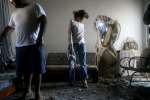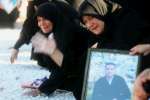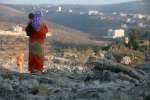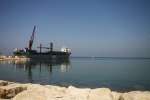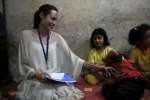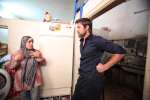- Text size
 |
|  |
|  |
| 
- عربي
UNHCR chief meets struggling Syrian refugees in Lebanon
News Stories, 15 April 2015
DEBANE INFORMAL SETTLEMENT, Lebanon, April 15 (UNHCR) – UN High Commissioner for Refugees António Guterres this week visited Syrian refugees living in harsh conditions in informal settlements in south Lebanon and called on the international community to do more to ease their plight.
Lebanon is host to nearly 1.2 million Syrian refugees, representing around a quarter of the country's total population. The massive influx since the start of the Syria crisis in March 2011 has seen refugees settle in every corner of the country, putting a huge strain on stretched services and infrastructure.
"The equivalent of what we have in Lebanon in the United States would be more than 80 million refugees coming into the United States. You can understand that this has a terrible impact on the economy and society of Lebanon," Guterres said on Tuesday in Debane, an informal settlement near the southern city of Ghaziye.
Almost a fifth of Syrian refugees in Lebanon live in informal settlements like Debane, where Guterres and Abdullah Al-Matouq, the UN's secretary-general's Humanitarian Envoy for Kuwait, met the residents and discussed the challenges they face.
Next to a dirt road in the shadow of the main coastal highway, the Debane settlement is a huddle of 23 makeshift shelters built from wooden planks and plastic sheeting and currently home to 30 Syrian families. Located on a strip of public land, the refugees are not allowed to make permanent constructions, with the result that living and sanitary conditions remain basic.
Mohammed, aged 44 years, and nine members of his family have lived there since 2012, when they fled the western Syrian city of Hama after their house was destroyed by bombing.
Asked by Guterres to describe the biggest difficulties facing them, Mohammed cited new government regulations requiring Syrians in Lebanon, including refugees registered with UNHCR, to pay a fee of US$200 each to renew their residency permits, which he said he and his family were unable to afford.
He also expressed his deep concern for his children's education and the future of his unborn grandson. "These children, the new generation, there is no education here, the whole education system has changed for them, a whole generation is destroyed, what future is there for them?" he asked. "This little boy, who will be born in 10 to 15 days time, if we stay like this, he is going to be illiterate. This is an illiterate generation."
Of the 400,000 school-age Syrian children in Lebanon, UNHCR and the UN Children's Fund (UNICEF) are only able to provide funding for 106,000 places in the country's state schools with the remaining three quarters receiving no formal education.
Afterwards Guterres said the visit had highlighted the dramatic needs not only of the Syrian refugees, but also the Lebanese government and communities hosting them, together with other host countries in the region.
He welcomed pledges totalling US$3.8 billion for the Syria crisis response in 2015 made by international donors at a conference in Kuwait last month, but stressed that even more would be needed due to the scale of the catastrophe.
"We cannot accept that the Syrian people will go on living in these absolutely tragic circumstances, and we cannot accept that countries like Lebanon and Jordan are facing such a dramatic challenge to their own economies and to their own stability," he said.
By Charlie Dunmore in Debane informal settlement, Lebanon























